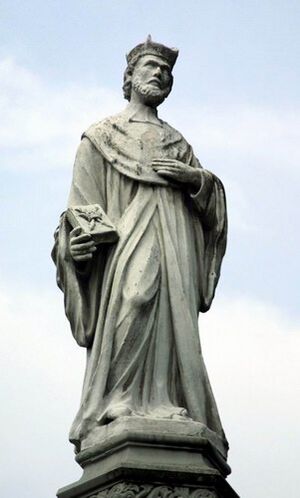John Cantius (nonfiction): Difference between revisions
No edit summary |
No edit summary |
||
| (One intermediate revision by the same user not shown) | |||
| Line 33: | Line 33: | ||
[[Category:Nonfiction (nonfiction)]] | [[Category:Nonfiction (nonfiction)]] | ||
[[Category:People (nonfiction)]] | [[Category:People (nonfiction)]] | ||
[[Category:Priests (nonfiction)]] | |||
[[Category:Philosophers (nonfiction)]] | |||
[[Category:Physicists (nonfiction)]] | |||
[[Category:Theologians (nonfiction)]] | |||
Latest revision as of 07:15, 4 May 2017
Saint John Cantius (Latin: Joannis Cantii, Polish: Jan z Kęt or Jan Kanty; 23 June 1390 – 24 December 1473) was a Polish priest, scholastic philosopher, physicist and theologian. He is also known as John of Kanty or John of Kanti or John Kantius.
In physics, he helped develop Jean Buridan's theory of impetus, which anticipated the work of Galileo and Newton.
During his time in Kraków, John Kanty became well known in the city for his generosity and compassion toward the poor, especially needy students at the university. He subsisted on what was strictly necessary to sustain his life, giving alms regularly to the poor. He made one pilgrimage to Jerusalem and four pilgrimages on foot to Rome.
He is credited with saying: "Fight all error, but do it with good humor, patience, kindness, and love. Harshness will damage your own soul and spoil the best cause."
Michael Miechowita, the medieval Polish historian and the saint's first biographer, described the saint's extreme humility and charity; he took as his motto:
Conturbare cave: non est placare suave,
Infamare cave; nam revocare grave. (Beware disturbing: it's not sweetly pleasing,
Beware speaking ill: for taking back words is burdensome.)
In the News
Fiction cross-reference
Nonfiction cross-reference
External links:
- John Cantius @ Wikipedia
